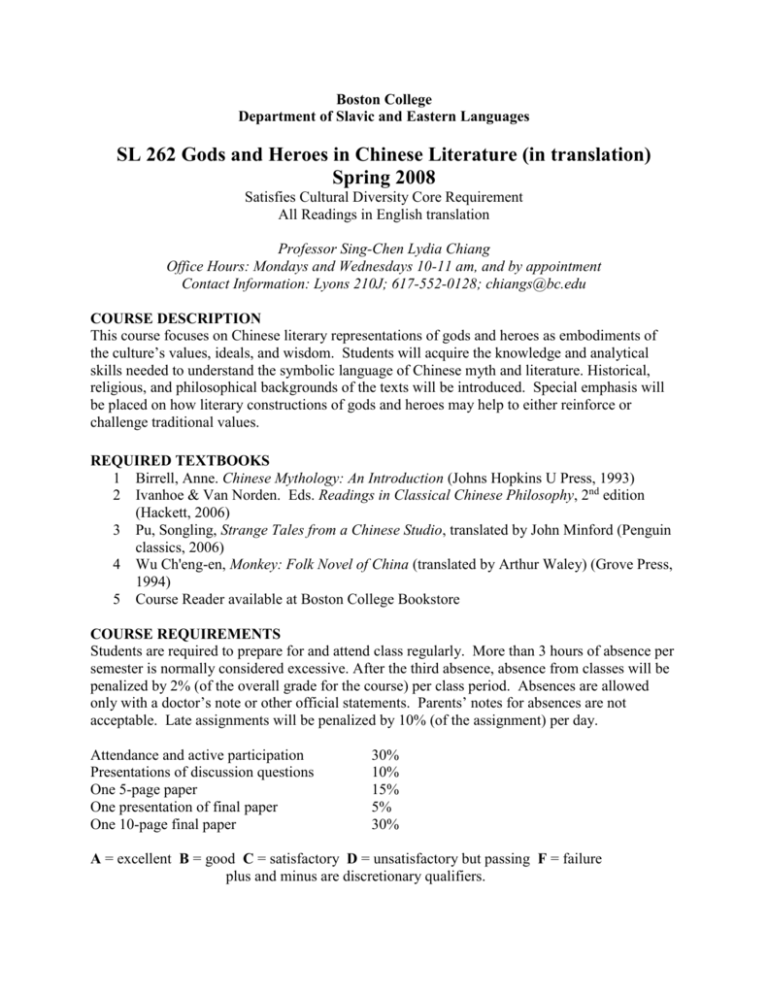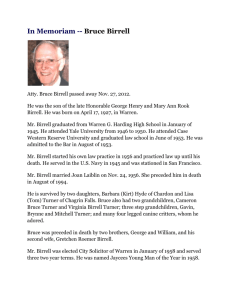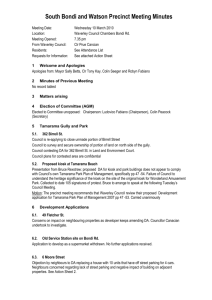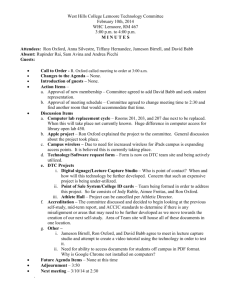262syl081 - Boston College
advertisement

Boston College Department of Slavic and Eastern Languages SL 262 Gods and Heroes in Chinese Literature (in translation) Spring 2008 Satisfies Cultural Diversity Core Requirement All Readings in English translation Professor Sing-Chen Lydia Chiang Office Hours: Mondays and Wednesdays 10-11 am, and by appointment Contact Information: Lyons 210J; 617-552-0128; chiangs@bc.edu COURSE DESCRIPTION This course focuses on Chinese literary representations of gods and heroes as embodiments of the culture’s values, ideals, and wisdom. Students will acquire the knowledge and analytical skills needed to understand the symbolic language of Chinese myth and literature. Historical, religious, and philosophical backgrounds of the texts will be introduced. Special emphasis will be placed on how literary constructions of gods and heroes may help to either reinforce or challenge traditional values. REQUIRED TEXTBOOKS 1 Birrell, Anne. Chinese Mythology: An Introduction (Johns Hopkins U Press, 1993) 2 Ivanhoe & Van Norden. Eds. Readings in Classical Chinese Philosophy, 2nd edition (Hackett, 2006) 3 Pu, Songling, Strange Tales from a Chinese Studio, translated by John Minford (Penguin classics, 2006) 4 Wu Ch'eng-en, Monkey: Folk Novel of China (translated by Arthur Waley) (Grove Press, 1994) 5 Course Reader available at Boston College Bookstore COURSE REQUIREMENTS Students are required to prepare for and attend class regularly. More than 3 hours of absence per semester is normally considered excessive. After the third absence, absence from classes will be penalized by 2% (of the overall grade for the course) per class period. Absences are allowed only with a doctor’s note or other official statements. Parents’ notes for absences are not acceptable. Late assignments will be penalized by 10% (of the assignment) per day. Attendance and active participation Presentations of discussion questions One 5-page paper One presentation of final paper One 10-page final paper 30% 10% 15% 5% 30% A = excellent B = good C = satisfactory D = unsatisfactory but passing F = failure plus and minus are discretionary qualifiers. SL 262 Gods and Heroes in Chinese Literature (Spring 2008) CLASS ATTENDANCE AND ACADEMIC INTEGRITY: Class attendance is MANDATORY. Please be reminded of the Boston College policy on academic integrity and attendance (see pp. 34-37 of the 2005-06 BC Catalog). BC expects all its students to adhere to its policy on academic integrity by following the accepted norms of intellectual honesty in their academic work. Any form of cheating, plagiarism, or dishonesty or collusion in another's dishonesty is a fundamental violation of these norms. The following has been excerpted from BC’s statement on academic integrity: Policy and Procedures The pursuit of knowledge can proceed only when scholars take responsibility and receive credit for their work. Recognition of individual contributions to knowledge and of the intellectual property of others builds trust within the University and encourages the sharing of ideas that is essential to scholarship. Similarly, the educational process requires that individuals present their own ideas and insights for evaluation, critique, and eventual reformulation. Presentation of others' work as one's own is not only intellectual dishonesty, but also undermines the educational process. Standards Academic integrity is violated by any dishonest act which is committed in an academic context including, but not restricted to the following: Cheating is the fraudulent or dishonest presentation of work. Cheating includes but is not limited to: the use or attempted use of unauthorized aids in examinations or other academic exercises submitted for evaluation; fabrication, falsification, or misrepresentation of data, results, sources for papers or reports, or in clinical practice, as in reporting experiments, measurements, statistical analyses, tests, or other studies never performed; manipulating or altering data or other manifestations of research to achieve a desired result; selective reporting, including the deliberate suppression of conflicting or unwanted data; falsification of papers, official records, or reports; copying from another student's work; actions that destroy or alter the work of another student; unauthorized cooperation in completing assignments or during an examination; the use of purchased essays or term papers, or of purchased preparatory research for such papers; submission of the same written work in more than one course without prior written approval from the instructors involved; dishonesty in requests for make-up exams, for extensions of deadlines for submitting papers, and in any other matter relating to a course. Plagiarism is the act of taking the words, ideas, data, illustrations, or statements of another person or source, and presenting them as one's own. Each student is responsible for learning and using proper methods of paraphrasing and footnoting, quotation, and other forms of citation, to ensure that the original author, speaker, illustrator, or source of the material used is clearly acknowledged. Other breaches of academic integrity include: the misrepresentation of one's own or another's identity for academic purposes; the misrepresentation of material facts or circumstances in relation to examinations, papers, or other evaluative activities; the sale of papers, essays, or research for fraudulent use; the alteration or falsification of official University records; the unauthorized use of University academic facilities or equipment, including computer accounts and files; the unauthorized recording, sale, purchase, or use of academic lectures, academic computer software, or other instructional materials; the expropriation or abuse of ideas and preliminary data obtained during the process of editorial or peer review of work submitted to journals, or in proposals for funding by agency panels or by internal University committees; the expropriation and/or inappropriate dissemination of personally-identifying human subject data; the unauthorized removal, mutilation, or deliberate concealment of materials in University libraries, media, or academic resource centers. Collusion is defined as assistance or an attempt to assist another student in an act of academic dishonesty. Collusion is distinct from collaborative learning, which may be a valuable component of students' scholarly development. Acceptable levels of collaboration vary in different courses, and students are expected to consult with their instructor if they are uncertain whether their cooperative activities are acceptable. 2 SL 262 Gods and Heroes in Chinese Literature (Spring 2008) SCHEDULE 1/14 M Introduction Part I: Mythology 1/16 W Origins (Birrell, Chapter 1) 1/18 F Cultural Bearers (Birrell, Chapter 2) 1/21 M Martin Luther King’s Day–No classes 1/23 W Cultural Bearers continued (Birrell, Chapter 2 continued) 1/25 F Saviors (Birrell, Chapter 3) 1/28 M Saviors continued (Birrell, Chapter 3 continued) 1/30 W Destroyers (Birrell, Chapter 4) 2/1 F Destroyers continued (Birrell, Chapter 4 continued) 2/4 M Miraculous Birth (Birrell, Chapter 5) 2/6 W Myths of the Yellow Emperor (Birrell, Chapter 6) 2/8 F Myths of Yi the Archer (Birrell, Chapter 7) 2/11 M Myths of Yu the Great (Birrell, Chapter 8) 2/13 W Goddesses (Birrell, Chapter 9) 2/15 F Love (Birrell, Chapter 12) 2/18 M Heroes (Birrell, Chapter 13); “Ballad of Mulan” (Reader) 2/20 W Founding Myths and Review (Birrell, Chapter 16 and Introduction); short paper due Part II: Philosophy and History 2/22 F Sima Qian, “Letter to Ren An,” “Biographies of Assassins” (Reader) 2/25 M “Biographies of Assassins” continued (Reader) 2/27 W Introduction to Confucianism (Ivanhoe, Chapter 1 The Analects, Books 1–9) 3 SL 262 Gods and Heroes in Chinese Literature (Spring 2008) 2/29 F Confucianism continued (Ivanhoe, Chapter 1 The Analects, Books 10–20) Spring Vacation (March 3–March 7) 3/10 M Introduction to Daoism (Ivanhoe, Chapter 4 The Daodejing) 3/12 W Daoism continued (Ivanhoe, Chapter 5 Zhuangzi, chapters 1–4) 3/14 F Daoism continued (Ivanhoe, Chapter 5 Zhuangzi, chapters 5–32) Part III: Fiction 3/17 M Immortality (Birrell, Chapter 10); “Scholar Ts’ui,” “Tu Tzu-ch’un” (Reader) 3/19 W “A Taste of Immortality” and Pu Songling, “The Taoist Priest of Mount Lao” (pp. 50–54), and Chiang’s article on Niu Sengru (Reader) Easter Weekend (March 20–March 24) 3/26 W Monkey (Introduction, Chapters I–VII) 3/28 F Monkey (Chapters VIII–XIV) 3/31 M Monkey (Chapters XV–XXI) 4/2 W Monkey (Chapters XXII–XXX) 4/4 F Conference–No class for SL 262 4/7 M Horror fiction (Pu Songling, “Introduction,” pp. xi–xxxi; “Living Dead,” pp. 10–14; “Spitting Water,” pp. 15–17; “Talking Pupils,” pp. 18–22; “The Troll,” pp. 28–30; “Biting a Ghost,” pp. 31–33; “Catching a Fox,” pp. 34–36; “The Monster in the Buckwheat,” pp. 37–39; “The Haunted House,” pp. 40–42; “Wild Dog,” pp. 95–97; “Wailing Ghosts,” pp. 104–06; Scorched Moth the Taoist,” pp. 109–11; “Big Sneeze,” pp. 362–63) 4/9 W Fox Lore (“The Merchant’s Son,” pp. 133–40; “Grace and Pine” pp 76–86) 4/11 F Fox Lore continued (Pu Songling, “Ritual Cleansing,” pp. 121–23; “King of the Nine Mountains,” pp. 229–34; “Bird,” pp. 338–47) 4/14 M The Phantom Heroine (Pu Songling, “The Magic Sword and the Magic Bag,” pp. 168–79); “A Chinese Ghost Story” (Film); “Twenty Years a Dream,” (pp. 280–89) 4/16 W The Phantom Heroine continued (Pu Songling, “Lotus Fragrance,” pp. 211–28; “Silkworm,” pp. 238–49) 4 SL 262 Gods and Heroes in Chinese Literature (Spring 2008) 4/18 F Enlightenment (Pu Songling, “The Painted Wall,” pp. 23–27; “Adultery and Enlightenment,” pp. 383–86; “Coral,” pp. 436–45) 4/21 M Patriot’s Day–No classes 4/23 W Student presentations of final papers 4/25 F Student presentations of final papers 4/28 M Student presentations of final papers 4/30 W Student presentations of final papers Study break (May 2–May 5) 5/8 Th Final paper due by 5 pm at Lyons 210J 5






